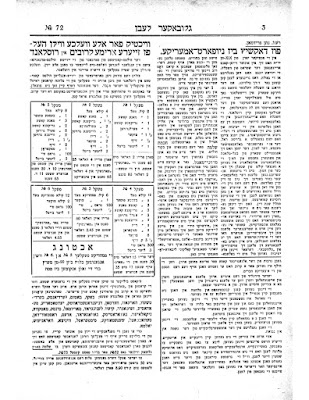From Dokshitz to Newport-America
by Rev. Nathan Friedman
translated by Aaron Ginsburg
puliished in Gluboker Leben
March 18, 1932
The story continues. Thanks to Margarita Kozhenevskaya for finding this article which was published in Yiddish in Glubokie, then in Poland. Nathan Friedman immigrated to Newport, Rhode Island, where he died after many years of serving the community.
From Dokshitz to Newport-America
by Rev. Nathan Friedman
In the eighties of the 19th century, the stream of enlightenment poured into our riparian region. The Jewish youth then believed that redemption, the richer life, could come only through education. The urge for enlightenment, which had a strong impact in Germany for many decades, thanks to the theorist of the Romantic Enlightenment, Mendelssohn, finally came to Russia.
The Haskalah infiltrated the balabatish households, whose sons studied in the yeshivot and represented the religious aristocracy. In those days yichis (genealogy) played a great role, the so-called liberal man, the scholar, the priviledged were strrictly separated from the craftsman and simple man, the balabatish psychology was a whole cult that stood above the masses.
With the greatest effort, the young man used to try not to be a soldier. Apart from going to worship, it was a difficult thing because it took 6 years and people had to live in the filthy Russian barracks, eat treif and violate the Sabbath, worship was not considered a fine thing and every father had an assignment. “Avoid the draft.”
The tsarist administration had allowed itself to be ostracized almost everywhere, but if it had been a stricter place, people would have to register elsewhere where the administration allowed itself to act.
In a word, the balabatish avoided military service. Therefore, all the yeshivas were filled with the balabatish bridegrooms.
Fathers used to take the young ones on trips, then they were forced to open a shop, and most of the women became the business leaders.
I was in Dvinsk for three years and could not do any business there, I came back to Dokshitz and went into business with Reb Iser Kaminkemich, a haberdashery shop, and as it did not carry the business for granted I turned over this business to my younger brother. I began to give lessons in Russian and Hebrew, and at the same time helped all Jewish organizations with deeds and with money, though it took a half part in a performance of the wisdom of Solomon for the benefit of Bekor Holim.
At that time our first son, Mordecai Matel, was born to us. We spent a very short time in Doskhitz then quickly returned to Dvinsk, and immediately I got a job giving private lessons from a rich man, teaching Hebrew to his two sons who were in the gymnasia. Through this man I became acquainted with other rich men. I became well known and friendly with the Dvinsk city administration, where I was able to help many people, make a living, give Hebrew and Russian lessons, and also with advocacy before the justice of the peace.
And in my spare time, I assisted my father-in-law, R 'Isaiah Meyerson, in his business dealings with the goods and grain on the Tavarni Station, on the Calcio Livov-Romansky railroad.
